
Overview
- The IDF launched a surprise attack on terror targets in Gaza as part of Operation “Strength and Sword” to apply pressure on Hamas to continue the Hostage Deal.
- Itamar Ben Gvir and his party “Jewish Power” returned to the governing coalition as the war resumed, with each of the party ministers reassuming their previously held portfolios.
- Prime Minister Benjamin Netanyahu announced his intention to dismiss Shin Bet chief Ronen Bar which caused tensions between the government and the judiciary culminating in protests against the government.
- Turkish President Recep Tayyip Erdogan initiated an unprecedented political crackdown, arresting Istanbul’s Mayor Ekrem İmamoğlu, a leading opposition presidential candidate
- On March 17, President Trump explicitly declared the U.S. would hold Iran accountable for all Houthi attacks
- The Houthi Foreign Minister Jamal Amer stated that the Houthi movement is effectively at war with the United States, warning Gulf states such as Saudi Arabia and the UAE to remain neutral.
- The Israeli Air Force attacked strategic targets around military bases in Syria
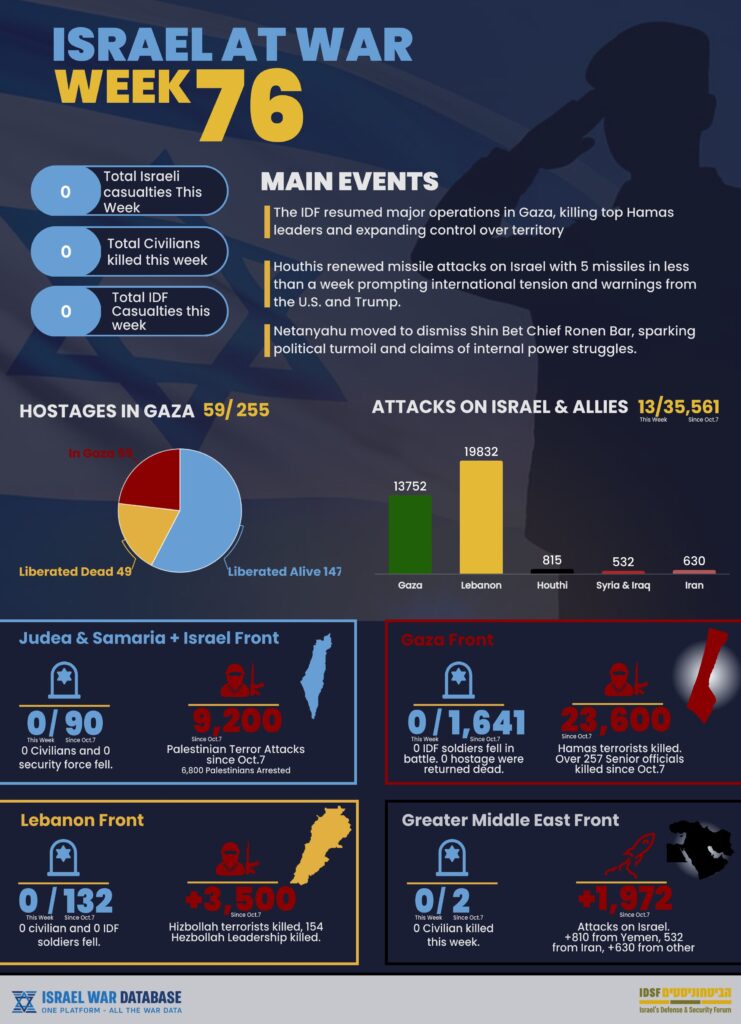
Gaza
Hostage Deal
Prime Minister Netanyahu addressed the media from the Kirya base in Tel Aviv, stating that over recent weeks Israel had tirelessly pursued one main goal: releasing hostages. Despite extending the ceasefire, dispatching delegations to Doha and Cairo, and accepting the Witkoff proposal, Hamas rejected every initiative. Netanyahu declared, “We have therefore returned to fighting with strength.” He emphasized that, based on recommendations from the IDF and security agencies, Israel has resumed intense combat operations against Hamas, stating clearly that from now on, negotiations would proceed only under fire. Netanyahu stressed that he acted upon professional military advice, attempting to counter accusations from his political opponents that he resumed fighting for political reasons—to divert attention from investigations linked to the Qatar-gate scandal.
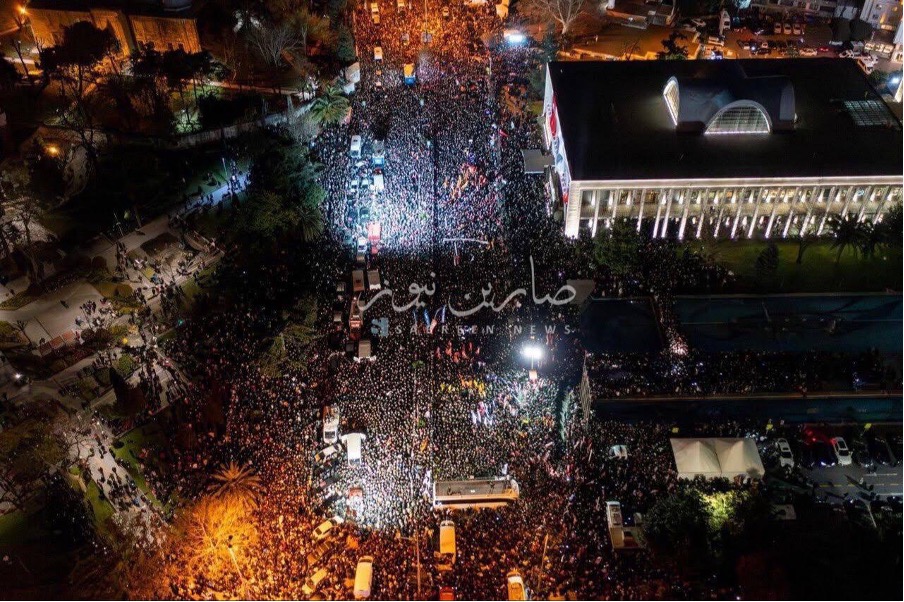
Operational
- The IDF launched a surprise attack on terror targets in Gaza as part of Operation “Strength and Sword”. Israel determined that since no additional hostages were released by Hamas nor seemed like they were likely to do so, while Israel had extended the ceasefire, it determined that the extension of the cease-fire was actually harmful to Israel and was making the release of hostages less likely while allowing Hamas more time to regroup and threaten Israel. Consequently, Israel initiated this operation to exert pressure on Hamas to release additional hostages. According to a statement from the office of the Minister of Defense, this is part of a phased operational plan designed to intensify pressure gradually without endangering hostages’ lives, aiming to compel Hamas to agree to a hostage-release deal. Thus, the operation represents a final attempt to secure hostage releases before resuming broader fighting.
- The decision to resume combat operations caught Hamas leaders completely by surprise; many chose to sleep at home with their families rather than in underground tunnels. Throughout the 58-day ceasefire, Israeli Military Intelligence gathered intelligence on these figures. While Hamas planned attacks along the buffer zone and within communities surrounding Gaza to influence negotiations, Israel preemptively targeted senior Hamas and faction leaders to pressure them into accepting another hostage deal without committing to an end of hostilities.
- The opening strike occurred at precisely 2:10 a.m. on Tuesday morning and lasted only ten minutes. During that brief time, approximately 80 targets were simultaneously attacked. In addition to eliminating senior terrorist figures, many of their family members were also killed, including the commander of the Shuja’iyya battalion and his three sons, a senior figure in the Rafah Brigade along with his family, and several family members of the commander of the Rafah Brigade. This initial strike served both as a lever for negotiations and a direct blow to the terror factions’ command structure and military infrastructure ahead of a potential return to large-scale fighting.
- The IDF Spokesperson confirmed ground operations in Gaza’s Shabora neighborhood in Rafah, where Israeli forces destroyed terrorist infrastructure. Similar operations took place in northern Gaza, targeting infrastructure, including a Hamas command and control center used extensively over the past months. Fighter jets and UAVs supported these operations by striking terrorist operatives and infrastructure. Local reports indicate that IDF ground forces expanded their activities into the Tel al-Sultan refugee camp in Rafah and also into the Al-Atatra neighborhood west of Beit Lahia in northern Gaza.
- The IDF began targeted ground activities in central and southern Gaza aiming to expand the security buffer and protect communities around the Gaza border. Forces have recaptured Netzarim Junction, reaching the Salah al-Din Road and have taken control of Kuwait Square, effectively bisecting Gaza.
- The current campaign remains measured, indicating the government’s hope of reaching a hostage agreement. Yet, nothing currently prevents the IDF from resuming intense fighting in Gaza City itself, the central refugee camps, and Deir al-Balah to fully dismantle Hamas, pending government decisions.
- Israeli Defense Minister Israel Katz stated, “Soon, civilian evacuations from combat zones will resume,” urging Hamas to release all hostages and advising Gaza’s residents that they have the option to relocate to other countries worldwide.
- Meanwhile, the Rafah border crossing has been closed for patients seeking medical treatment abroad. Gaza remains under a complete siege (except for water) for the past 17 days, resulting in growing shortages of food and supplies and rising prices. Hamas has hoarded much of the food for its fighters which creates, according to reports, price rises among the population.
- Israeli Defense Minister Israel Katz warned that Israel would annex parts of Gaza territory for every hostage killed, intending to hurt Hamas where it would hurt most—the loss of land. Hamas officially confirmed the deaths of six senior officials following Israeli strikes, including prominent political and security leaders within the organization. Additionally, Naji Abu Saif (“Abu Hamza”), spokesman of the military wing of Islamic Jihad, was reportedly killed in an Israeli attack.
- In further targeted operations, the IDF and Shin Bet eliminated Rashid Jahjuh, head of Hamas’s General Security Service, a secretive agency responsible for internal security, intelligence, suppression of dissent, and anti-Israel propaganda. Osama Tabesh, Hamas’s military intelligence chief for southern Gaza and head of surveillance operations, was also killed.
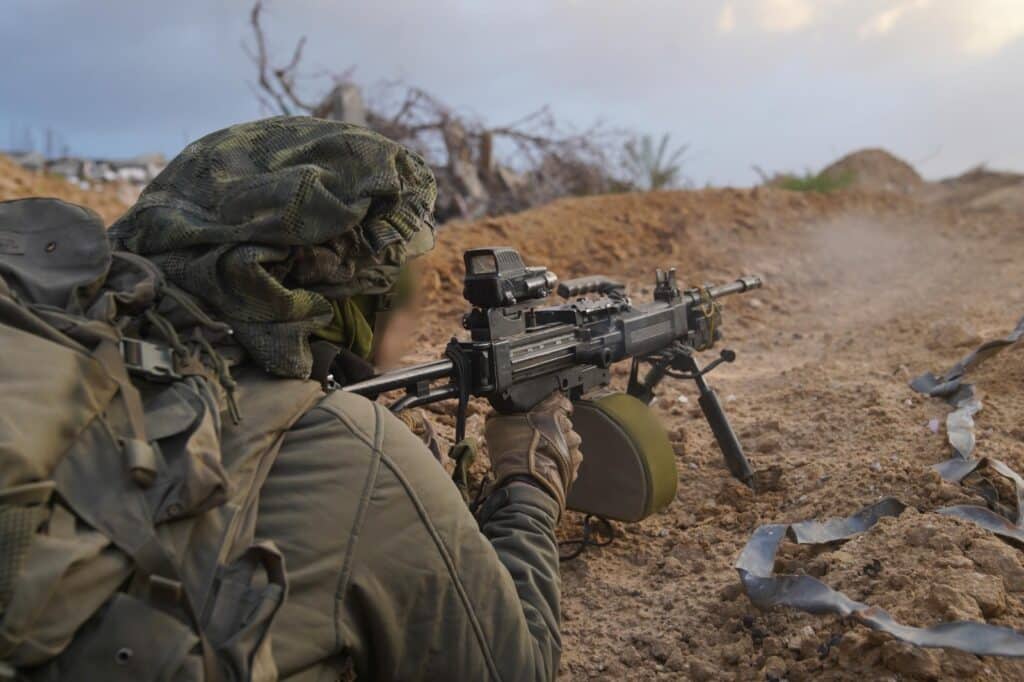
International Reactions to Renewed Fighting in Gaza
- The U.S. State Department placed responsibility on Hamas for the resumption of hostilities, arguing the conflict could have been avoided had Hamas accepted U.S. special envoy Steve Witkoff’s proposal.
- The French Foreign Ministry condemned the renewed Israeli strikes, calling for their immediate cessation due to the risks posed to hostages and Palestinian civilians.
- Britain urged both Israel and Hamas to fully restore the ceasefire, emphasizing that reports of civilian casualties were “horrifying.”
- Hamas condemned the Israeli attacks, claiming they endangered Israeli hostages, and called on the international community to halt what it labeled Israel’s “war of extermination.”
Domestic Israel
- IDF Chief of Staff Lieutenant General Eyal Zamir announced the formation of an external team tasked with reviewing and implementing the lessons from the investigations into the October 7 massacre.
Firing of Shin Bet Director Ronen Bar
- Prime Minister Benjamin Netanyahu has announced his intention to dismiss Shin Bet chief Ronen Bar, citing “ongoing distrust.” Netanyahu released a video explaining that during a period of existential war on multiple fronts, full trust between the Prime Minister and the head of Shin Bet is essential—trust that, according to Netanyahu, no longer exists. Officials close to Netanyahu have accused Bar of threatening the Prime Minister’s office daily and fabricating politically motivated investigations after learning of Netanyahu’s plans to remove him. They emphasized that replacing the Shin Bet chief is legitimate in any democratic country and rejected claims that this decision is linked to the “Qatar-gate” scandal.
- Ronen Bar had a falling-out with Netanyahu over Bar’s role in drafting the probe into the Shin Bet’s failures during the October 7th attacks. The report largely shifted responsibility away from the Shin Bet and instead criticized the government’s policy of allowing Qatari funding to Gaza. Critics argued that the probe read more like a political manifesto, sharply critical of government actions while protecting Shin Bet from accountability. The report thus generated significant tension with the Netanyahu government, prompting complaints from former Shin Bet officials who accused Bar of adopting a politically motivated approach, turning the investigation into something resembling a political pamphlet rather than an objective internal review.
- Later, Ronen Bar declared that he would resign before completing the task of conducting the war and thoroughly investigating Shin Bet’s failures. He publicly suggested that the government should appoint one of his deputies as his successor. He subsequently walked back these statements, but the Netanyahu government viewed his remarks as presumptuous and as an inappropriate attempt to dictate government decisions clearly within its own authority.
- Amid the ensuing clash between the Attorney General and the government regarding the legality of dismissing Ronen Bar, Bar released a public letter to Prime Minister Netanyahu. In it, he sharply criticized the government, arguing he was denied the opportunity to properly defend himself against dismissal. Bar asserted that there had never been a genuine falling-out between himself and Netanyahu, emphasizing that allegations of mistrust were vague, unfounded, and lacking specific evidence.
Qatar gate Allegations
- The Shin Bet is investigating allegations of Qatar’s penetration to the Prime Minister’s closest circles. The past week new details came out regarding the mechanism by which Eli Feldstein, a former Netanyahu spokesperson, had been paid by a Qatar lobbyist. Recordings have surfaced in which Israeli businessman Gil Birger admits to transferring funds from U.S. lobbyist Jay Footlik, who is registered as an agent of Qatar, to Eli Feldstein, a spokesperson in the Prime Minister’s Office. Birger stated that Footlik requested his assistance in transferring the funds to Feldstein for tax reasons.
- It has been reported that two more people were apprehended but the investigation is still under a gag order, leaving many to speculate about the affair.
- The Israeli opposition accused Prime Minister Benjamin Netanyahu of dismissing Shin Bet chief Ronen Bar to obstruct investigations into his aides, alleging a conflict of interest. They argue that the renewed Gaza offensive serves to divert attention from domestic scandals, labeling it “Netanyahu’s war” and holding him responsible for the hostage crisis. This narrative aligns with Hamas propaganda, which portrays the conflict as senseless killings, lacking strategy and endangering hostages
- In response, Netanyahu dismissed these allegations as politically motivated, accusing the media of echoing Hamas propaganda. He maintains that the military actions are necessary due to Hamas’s refusal to release hostages and to prevent potential attacks.
- The Israeli Supreme Court temporarily froze Bar’s dismissal, pending further review, highlighting the legal complexities surrounding this issue.
- In summary, while the opposition and Hamas attribute political motives to Netanyahu’s recent actions, the government asserts that its decisions are driven by security considerations.
- Hamas has closely monitored these internal political tensions and exploited them for use them in its propaganda. Hamas issued an official statement claiming that Bar’s remarks reveal Netanyahu as the main obstacle to prisoner exchange agreements due to his political considerations. The group urged U.S. officials to hold Netanyahu responsible, rather than Hamas, for the failure of negotiations.
Tensions between the Government and Judiciary
- Attorney General Gali Baharav-Miara asserted that the Israeli government cannot unilaterally dismiss Shin Bet chief Ronen Bar without adhering to established legal procedures. She referenced a 2016 government decision mandating that the dismissal of senior officials, such as the head of the Shin Bet, requires the recommendation of the Senior Appointments Advisory Committee.
- The opposition petitioned the Supreme Court to stop the removal of Bar. On March 21, 2025, Israel’s Supreme Court issued a temporary injunction halting the government’s decision to dismiss Shin Bet chief Ronen Bar. This order remains in effect until the court reviews petitions challenging the dismissal, with a hearing scheduled no later than April 8, 2025.
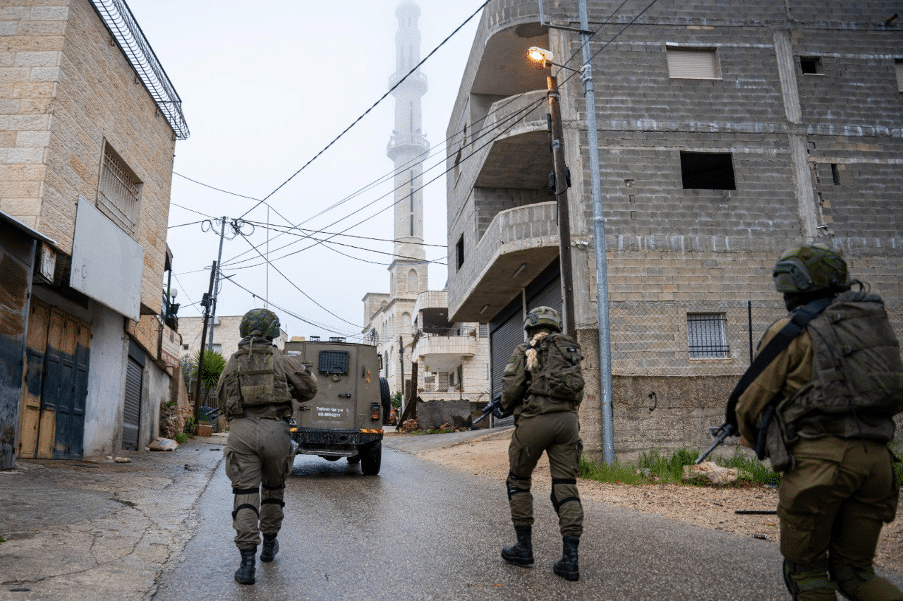
Renewal of the Protests
As a result of the new tensions between the government, the judiciary and the Shin Bet, the anti-Netanyahu protests movements renewed their actions. They protested near Netanyahu’s Jerusalem residence and in Tel Aviv.
These domestic frictions raise concerns on a potential deterioration into a crescendo of violent rhetoric, reminiscent of the so-called “October 6th mentality”, or severe domestic frictions. However, today’s Israel is still united against its enemies, understands the gravity of the threat, and even protest leaders shake off any calls for reporting from military service as a pressure tool.
Political Scene
- Itamar Ben Gvir and his party “Jewish Power” returned to the governing coalition as the war resumed, with each of the party ministers reassuming their previously held portfolios. Netanyahu struck a deal with the party to pass the next budget which will allow the government fulfill one of its constitutional obligations, to pass a budget, as failing to get enough votes to pass a budget would trigger a new election. As tensions with the Ultra-Orthodox parties is at an all-time high over the draft bill, Netanyahu needed to secure a slim majority of 60-59 to pass the bill.
- Gideon Saar of the “United Right” Party who joined the government, struck a deal to run with the Likud in the next elections, meaning that he would return to his original political party.
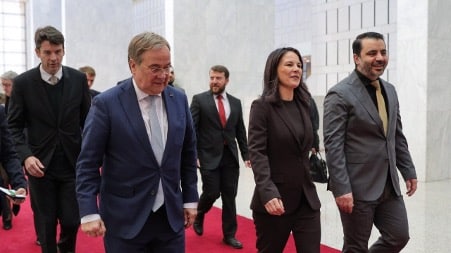
Judea and Samaria
In the past week, Israeli security forces have arrested 70 wanted individuals throughout Judea and Samaria. Additionally, a number of weapons were confiscated during these security operations.
Lebanon
- The IDF struck two military sites in Lebanon’s Beqaa Valley. One location contained underground infrastructure, and the other housed Hezbollah rocket launchers.
- Rockets were launched from the vicinity of the village of Arganoun toward the Israeli town of Metula. Two rockets fell within Lebanese territory, and three others were intercepted. On Saturday March 22 the IDF targeted dozens of rocket launchers and a Hezbollah command center in the areas surrounding Nabatieh and southern Lebanon. At least four Lebanese fatalities were reported, while Hezbollah denied any involvement in the rocket attacks, which would constitute the most significant breach since the ceasefire began on November 27.
- The Lebanese Al-Mayadeen news network, which is affiliated with Hezbollah, reported that Lebanese Prime Minister Nawaf Salam warned against a resurgence of military activities along the border, cautioning that such actions could drag Lebanon into another war. Salam contacted Lebanese Defense Minister Michel Menassa, emphasizing the need to implement all necessary security and military measures and asserting that only the Lebanese government has the authority to decide on matters of war and peace. Additionally, Salam spoke with Jeanine Hennis-Plasschaert, the UN Secretary-General’s representative in Lebanon, urging the United Nations to increase international pressure on Israel to withdraw from Lebanese territory.
- In response to the IDF strikes in southern Lebanon, Lebanese President Joseph Aoun condemned attempts to draw Lebanon back into cycles of violence. He stated that the events that took place today, as well as incidents occurring in the south since February 18, constitute continuous aggression against Lebanon. President Aoun urged the oversight committee to closely monitor these developments to prevent further violations that might endanger the country. Furthermore, he instructed the Lebanese Defense Minister to undertake necessary actions to protect civilians and investigate the circumstances surrounding these incidents.
Syria
Military Activity
- The Israeli Air Force attacked military sites in southern Syria, targeting weapon stockpiles and equipment belonging to the former Assad regime that Sunni groups were attempting to refurbish and operationalize.
- Meanwhile, Syria’s new regime arrested Adnan al-Sayed, the deputy commander of the Palestinian militia “Liwa al-Quds,” in Aleppo—a significant development against pro-Assad factions
Diplomatic Activity
- Syrian President Al Julani and Syrian Foreign Minister Asaad al-Shibani met in Damascus with a delegation from the Arab League, headed by Hussam Zaki, assistant Secretary-General and personal representative of the Arab League’s Secretary-General.
- Sources informed Saudi television network Al-Arabiya that Syrian President al-Julani has requested Russian President Vladimir Putin to extradite deposed Syrian President Bashar al-Assad officially, intending to prosecute him in Syria.
- The Israeli Air Force attacked strategic targets remaining around military bases in Syria (at Palmyra and the strategic T-4 Airbase). Local reports indicated casualties. The aim of the attacks was to prevent strategic weapons from falling into the hands of the new Syrian army, but they also appear intended as a message to Turkey, which seeks to establish itself in central Syria, precisely in locations unacceptable to Israel.
Tensions on Syria-Lebanon Border
- Tensions surged along the Lebanon-Syria border following violent clashes involving factions allied to the former Syrian militia Hayat Tahrir al-Sham and armed tribal groups in Lebanon, resulting in fatalities. Syria accused Hezbollah fighters of infiltrating Syrian territory, abducting and executing three elite Syrian soldiers. Syrian forces subsequently shelled Shiite militia positions near Hermel in Lebanon, leading to civilian casualties on the Lebanese side. In response, the Lebanese Army exchanged fire with Syrian forces, escalating the conflict to a direct confrontation between Lebanon and Syria.
- Syrian defense officials have emphasized their goal to drive Hezbollah out of Syrian border regions, accusing the group of smuggling and drug trafficking. Hezbollah officially denied involvement in the events. Following dialogue between Lebanese Defense Minister Michel Mansa and his Syrian counterpart Marhaf Abu Qasra, both countries agreed to a ceasefire and increased military presence to secure the border and prevent further escalations.
- The Lebanese Army is joining the clashes between Hezbollah loyalists and the Syrian regime along the Syria-Lebanon border. The situation on the eastern and northeastern borders cannot continue, and we will not allow it to continue.
- Lebanese Foreign Minister Youssef Raji and his Syrian counterpart Assad al-Shibani met during a conference in Brussels, agreeing to continued diplomatic engagement to maintain sovereignty and prevent further deterioration along the border.
Turkey
Turkish President Recep Tayyip Erdogan initiated an unprecedented political crackdown, arresting Istanbul’s Mayor Ekrem İmamoğlu, a leading opposition presidential candidate. More than 100 individuals close to İmamoğlu, including journalists and fellow secular (Kemalist) politicians, were also detained. Authorities blocked social media platforms and restricted movements in Istanbul to suppress mass protests.
This crackdown followed the government’s decision to invalidate İmamoğlu’s university credentials—a mandatory requirement for presidential candidacy in Turkey. The arrest sparked massive demonstrations in Istanbul, Ankara, and other major cities, prompting widespread calls from opposition figures and protesters demanding Erdogan’s removal from power.
Although Erdogan might not have anticipated the scale of these protests, his history in power indicates confidence in handling severe political unrest. Nonetheless, İmamoğlu and his associates remain under detention, with significant political tension continuing to grip Turkey ahead of upcoming elections.
Yemen
- The Houthi rebels launched a several missiles toward Israel during the week, including one at 4:00 a.m. that woke up, millions of Israelis.
- U.S. Central Command attacked 17 targets in northern Yemen. Unlike previous strikes under the Biden administration, these were explicitly aimed at eliminating senior figures in the Houthi terror organization. Among those killed was the bodyguard of Abdul-Malik al-Houthi, the Houthi leader.
- A spokesperson for the Houthis vowed a response of “escalation for escalation,” noting that since October 2023, the Houthis had carried out 174 attacks on American military and civilian vessels, and 145 attacks against ships from other countries.
- On March 17, President Trump explicitly declared the U.S. would hold Iran accountable for all Houthi attacks, a statement following comments by IRGC Commander Hossein Salami, who had previously attempted to distance Iran from Houthi actions by claiming the group operated independently. Secretary of State Marco Rubio emphasized that the mission aims to continue until the Houthis can no longer threaten international maritime routes. National Security Adviser Waltz indicated that the U.S. is prepared to escalate actions against Iran if the Houthis’ attacks continue.
- The Houthi Foreign Minister Jamal Amer stated that the Houthi movement is effectively at war with the United States, warning Gulf states such as Saudi Arabia and the UAE to remain neutral. Amer acknowledged their neutrality thus far, emphasizing that further escalation remains possible.
Iran
- President Trump sent a direct message to Iranian Supreme Leader Ayatollah Ali Khamenei, giving a two-month deadline for reaching a new nuclear agreement.
- Khamenei responded defiantly, warning that any U.S. aggression would be met with harsh consequences. He also rejected allegations that Iran directs regional proxies, stating that groups such as the Houthis operate independently and affirming his belief that steadfastness would ultimately lead to the defeat of Israel.
International
- Eli Sharabi, an Israeli hostage released after 491 days in Hamas captivity, spoke before the UN Security Council. He described the severe torture, starvation, and deprivation he experienced, emphasizing that international humanitarian aid intended for Gazans was diverted by Hamas militants, never reaching the intended recipients.
- Jordan’s King Abdullah, during a meeting with French President Emmanuel Macron, called urgently for reinstating the ceasefire in Gaza and immediate humanitarian aid access, warning that Israeli military actions exacerbate humanitarian suffering and regional instability. Macron supported continued diplomatic negotiations to resolve the crisis.
- Egypt firmly denied reports alleging President Abdel-Fattah el-Sisi had agreed to resettle half a million Gazans in Sinai, describing such claims as false and contradictory to Egypt’s steadfast position against the forced displacement of Palestinians.
- Germany’s Foreign Minister Annalena Baerbock reopened the German embassy in Damascus after 13 years, signaling a significant shift as Germany discusses repatriating Syrian refugees and providing over €300 million in humanitarian aid to Syria.
- On 17 March, the European Union held the 9th edition of the annual Brussels Conference “Standing with Syria: meeting the needs for a successful transition.” The Conference was attended by representatives from EU Member States, neighboring countries, other partner countries, international organizations (including the UN), and international financial institutions. For the first time a representative of the Syrian interim government attended. During the conference the EU pledged nearly €2.5 billion for 2025 and 2026, contributing to the total amount of €5.8 billion pledged by the international community. The UK also pledged up to £160 million. In her speech during the conference, Commission President von der Leyen underlined that alongside addressing the immediate needs of Syrians, it is crucial to start looking to the future of the country. The co-chairs – Commissioner for the Mediterranean Suica and Commissioner for Humanitarian Aid and Crisis Management – and Syria’s Minister for Foreign Affairs reaffirmed their wish to work together to ensure the success of the post-Assad transition.
- On 20 March, during the European Council Summit – bringing together heads of state and government of EU Member States – European leaders discussed amongst others the situation in the Middle East. In the conclusions published in the evening, the European Council criticized the breakdown of the ceasefire in Gaza, and urged Hamas to release remaining hostages, as well as reiterating its call for a full implementation of the ceasefire-hostage release agreement.
- The conclusions also welcomed the Arab Recovery and reconstruction Plan from the Cairo Summit and reaffirmed leaders’ commitment to a two-state solution, supporting the Palestinian Authority. Furthermore, leaders welcomed the end of Lebanon’s political impasse and called for the implementation of the ceasefire agreement and UN resolutions.
